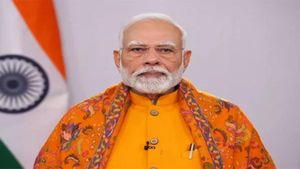February 24, 2025, marked yet another significant day in world events, bringing with it the latest updates from various corners of the globe. From international sanctions to local policy promises, here's what you need to know.
Firstly, the conflict stemming from Russia's invasion of Ukraine has reached its third anniversary, prompting Australia to take action. Prime Minister Anthony Albanese alongside Defense Minister Richard Marles and Foreign Minister Penny Wong announced new sanctions directed at individuals and entities supportive of Russia's actions, particularly those backing the annexation of Eastern Ukraine and Crimea. This announcement was made through a joint statement, highlighting the need to address human rights abuses linked to the conflict, including sexual violence and the forced deportation of Ukrainian children. According to reports, this war has resulted in the largest destruction and loss of life across Europe since World War II.
Simultaneously, the Australian federal government has pledged to guarantee nine out of ten visits to general practitioner clinics will be free of charge within the next decade. This promise, welcomed by the National Rural Health Alliance, is part of Albanese's ambitious $8.5 billion support plan. The scheme includes initiatives to train more general practitioners (GPs) and to create nurse scholarship opportunities, addressing the pressing health care needs, especially within regional and remote areas. Despite support from both major political parties for this initiative, concerns remain over how the government plans to fund this substantial financial undertaking.
On another note, Telegram, the popular messaging app, found itself on the wrong side of Australia's eSafety regulations. The platform was fined approximately $1 million AUD for delays in submitting transparency reports requested by regulatory authorities. The reports were meant to clarify how Telegram is combating issues related to terrorism, extremism, and child exploitation on its platform. Julie Enman Grant from eSafety emphasized the significant impact of this delay, which hindered regulatory efforts for nearly six months. Telegram has argued against the penalty, declaring it “unfair and disproportionate.”
Meanwhile, back home, health experts are raising concerns about the side effects of common antibiotics. Recent discussions suggest these medications might weaken metabolic health by not discerning between beneficial and harmful bacteria, leading to potential metabolic disorders. This highlights the need for more targeted approaches to antibiotic use.
Continuing with health news, South Korea has made steps toward developing radiation dose assessment models focused on pediatric health. This advancement, poised to be recognized as international standards, serves as another layer of commitment to ensuring safety during medical evaluations.
Adding to this, Dennis Noble, a prominent figure in physiology, has been appointed as the chair professor at DGIST, marking another juncture of innovation within the field of medical research.
On the economic front, the Korean Land and Housing Corporation (LH) announced its plan to supply over 19,000 public housing units and 28,000 public land sites this year. LH, led by CEO Lee Han-jun, emphasizes improving housing quality and affordability amid rising prices, focusing on various demographics, including youth, newlyweds, and seniors. The approach aims to address not only immediate housing needs but also the broader issues related to low birth rates and aging populations.
The LH's ambitious housing strategy also plans to leverage new technologies to improve construction standards, thereby enhancing overall housing quality. This strategy is part of the government's broader efforts to stabilize and invigorate the economy.
Lastly, as the world continues to adapt to post-pandemic realities, its effects are evident across diverse sectors, including how communities engage with governance and public health systems, ensuring equitable access to resources and services.
Today's news paints both challenges and actionable plans as nations navigate complex socio-economic landscapes. From health sector reforms to international diplomacy, February 24, 2025, reflects a commitment to progress amid uncertainty.



